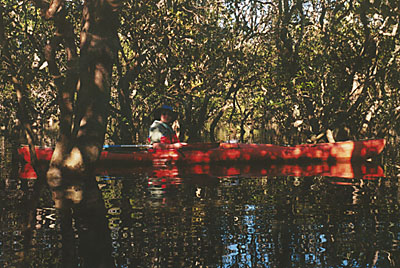Sinclair, Alison
 I'm
coming to recognize that the quintessential Sinclair character is someone like
Erien, a dual
citizen. I was born Scots - well, thanks to the British Army, in Colchester
- raised in Edinburgh, Scotland and Victoria, B.C., and have subsequently lived
in Hamilton, Ont, Boston, MA, Leeds, England, Calgary and at present, Ottawa.
I'm
coming to recognize that the quintessential Sinclair character is someone like
Erien, a dual
citizen. I was born Scots - well, thanks to the British Army, in Colchester
- raised in Edinburgh, Scotland and Victoria, B.C., and have subsequently lived
in Hamilton, Ont, Boston, MA, Leeds, England, Calgary and at present, Ottawa.
I remember vividly the moment I grasped "story". It was a Saturday
afternoon; I was about fourteen. I was in the family rec room study, reading
a novel called "Andra", a YA novel about a young girl who leads a
rebellion against a repressive postholocaust regime. There is a moment in that
novel when one of the characters says, in essence ... All this happened because
she was Andra. And that was the moment at which I realised: character drives
plot. It was at that moment that I started to be capable of original writing,
although it would be many years before I gained the technical proficiency to
realise that epipheny.
I had a rich, very nineteenth century Arts education given me between the ages
of twelve and nearly sixteen (in Edinburgh), an extraordinary imposition on
a young creature who was very much of the twentieth century and a scientist,
to boot. It seemed intended more for the adult that the child was to become
than the child; an unfashionable concept now, but I have fed imaginatively off
that four year's schooling ever since, even if Miss Miller made little headway
with my execrable spelling. For some obscure reason, though, our teachers chose
to present us first with Shakesphere's subtle and bawdy comedies; aged thirteen,
I saw no more point in all those silly machinations of love potions and mistaken
identies than I did in the posters of pop idols Marc Bolan and Sweet that my
more worldly classmates plastered inside the book cupboard. It wasn't until
Julius Caesar that Shakesphere 'took'. Politics, ambition, betrayal, assassination,
poetry, rhetoric! Aged fourteen I fell madly in love with Paul Scofield in A
Man for All Seasons: politics, ethics, law and conscience. The fifteenth century
was the best age. I had the classic education of the colonized, though I didn't
recognize it as such until later: English history, English literature, indeed,
English language. Scots entered from offstage in 1601 in the form of the ill-omened
Stewarts: "Three fools and a knave" - the knave being the canny and
accomplished James I. Scots history I learned by anecdote, by folklore, from
my mother, my aunts and uncles, and encoded in folk song and ballad. Alas poor
Macbeth. History knows him as a good king. The world knows him by Shakesphere.
Thereafter, in no particular order, I encountered such dramatics works as J.M.
Synge's unfinished masterpiece "Deirdre of the Sorrows", Musgrave's
great realistic pacifist statement "Sergeant Musgrave's Dance", a
brilliant French film whose title I wish I could remember about the events leading
up to the revolution, another film "Nineteen nineteen" about the last
two patients of Sigmund Freud, and the history they lived; James Goldman's witty
and modern "The Lion in Winter"; Jean Anoulh's "Antigone",
the plays of Hendrik Ibsen and very recently, Michael Frayn's dazzling "Copenhagen",
in which scientific metaphor and scientific ethics are seamlessly blended into
drama. I confess also to a love of the common swashbuckler: "Scaramouche",
"Zorro", "Robin Hood" (in all his variations), "The
Princess Bride" ("I've something to tell you ... I'm not left handed
...")
Appearances in Reflections
on Water
 I'm
coming to recognize that the quintessential Sinclair character is someone like
Erien, a dual
citizen. I was born Scots - well, thanks to the British Army, in Colchester
- raised in Edinburgh, Scotland and Victoria, B.C., and have subsequently lived
in Hamilton, Ont, Boston, MA, Leeds, England, Calgary and at present, Ottawa.
I'm
coming to recognize that the quintessential Sinclair character is someone like
Erien, a dual
citizen. I was born Scots - well, thanks to the British Army, in Colchester
- raised in Edinburgh, Scotland and Victoria, B.C., and have subsequently lived
in Hamilton, Ont, Boston, MA, Leeds, England, Calgary and at present, Ottawa.